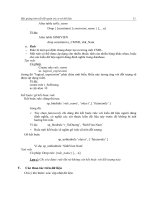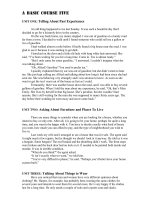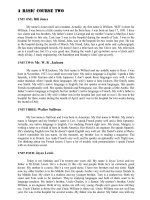Một khóa học cơ bản - phần 2 pot
Bạn đang xem bản rút gọn của tài liệu. Xem và tải ngay bản đầy đủ của tài liệu tại đây (68.12 KB, 4 trang )
A Basic Course five
Unit one: Telling About Past Experiences
An old thing happened to me last Sunday. It was such a beautiful day that I
decided to go for a leisurely drive in the country.
On the way back home, my motor stopped. I was out of gasoline on a lonely road
far from a town. I decided to walk until I found someone who could sell me a gallon or
two of gasoline.
I had walked almost a mile before I finally found a big house near the road. I was
glad to see it because it was starting to get dark.
I knocked on the door and a little old lady with long white hair answered. She
said, “I’ve been waiting for you for a long time. Come in. Tea is almost ready.”
“But I only came for some gasoline, “ I answered. I couldn’t imagine what she
was talking about.
“Oh, Alfred! Gasoline? You used to prefer tea.”
I quickly explained that my car was out of gasoline, but she didn’t seem to hear
me. She just kept calling me Alfred and talking about how long it had been since she had
seen me. She was behaving very strangely and I was anxious to leave. As soon as she
went to get the tea I went out of the house as fast as I could.
Fortunately, there was another house down the road, and I was able to buy several
gallons of gasoline. When I told the man about my experience, he said, “Oh, that’s Miss
Emily. She lives by herself in that big house. She’s peculiar, but she wouldn’t hurt
anyone. She’s still waiting for the man she was supposed to marry thirty years ago. The
day before their wedding he went away and never came back.”
Unit two: Asking About Furniture and Places To Live
There are many things to consider when you are looking for a house, whether you
intend to buy or only rent. After all, it is going to be your home, perhaps for quite a long
time, and you want to be happy with it. You have to decide exactly what kind of house
you want, how much you can afford to pay, and the type of neighborhood you wish to
live in.
Last week my wife and I arranged to see a house that was for sale. The agent said
it might need a few repairs, but he thought we should look at it anyway. He told us it was
a bargain. Some bargain! The roof leaked and the plumbing didn’t work. The front steps
were broken and the back door had no lock on it. It needed to be painted both inside and
outside. It was in terrible condition.
“What do you think?” the agent asked.
“It isn’t exactly what we want,” we told him.
“You’re very difficult to please,” he said. “Perhaps you’d better have your house
custom built.”
Unit three: Talking About Things to Wear
Have you noticed that men and women have very different opinions about
clothing? Mr. Harper, for example, has probably been wearing the same clothes for
several years and intends to wear them for several more. He’s very happy if his clothes
last for a long time. He only needs a couple of suits and a sports coat and slacks.
Occasionally he buys a shirt, a pair of socks, some underwear, or a new tie. Mr. Harper is
confident that he has enough clothing.
He thinks that his wife has plenty of clothes, too. She has several dresses, some
skirts and blouses, and a few pairs of shoes. But whenever they plan to go out for the
evening she says, “I don’t know what to do. I have nothing to wear.”
“What about all the things in your closet?” Mr.Harper asks his wife. But he knows
what the answer will be. One dress is out of style, another is too small or too short, and
the third just doesn’t appeal to her anymore. Sometimes Mr. Harper can persuade his wife
that something from her closet looks good on her. But once in a while she insists on
going shopping for a new dress and new shoes.
Mr. Harper talks a lot, but he doesn’t really mind if his wife buys new clothes
once in a while. Actually, he likes her to look attractive when they go to the theater or to
a party.
Unit four: Discussing Different Points of View
Some people are always starting an argument. They often have very little
information on the subject, but this doesn’t matter. They have strong beliefs, anyway.
There’s no point in debating with people like this because you can never resolve
anything.
But with other people a difference of opinion can start an extremely interesting
discussion. Each person tries to explain his point of view, but he listens to other
arguments, too. This type of conflict becomes an exchange of ideas instead of a quarrel.
Whether or not their differences are reconciled, each person learns something from the
experience.
In New England and in some other parts of the United States, citizens of the town
meet and talk over all local problems. The people sometimes disagree with each other,
and there may be some arguments. Each side will try to persuade others that its point of
view is the best. But frequently the two sides are not really far apart in their views, and
this kind of public discusion helps to settle their differences. This is a healthy situation.
Unit: five
Reading Practice: Describing Objects
Yesterday
Unit: six
Reading Practice: Describing Objects
Yesterday
Unit: seven
Reading Practice: Describing Objects
Yesterday
Unit: eight
Reading Practice: Describing Objects
Yesterday
Unit: nine
Reading Practice: Describing Objects
Yesterday
Unit: ten
Reading Practice: Describing Objects
Yesterday






![[Cơ Học Chất Lỏng] Thủy Khí Kỹ Thuật Úng Dụng - Huỳnh Văn Hoàng phần 2 pot](https://media.store123doc.com/images/document/2014_07/13/medium_FEg0ycni0k.jpg)


